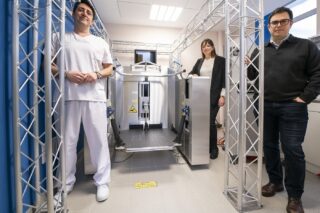David Ferreira & Monique Mrazek, International Finance Corporation (IFC).
The rapid evolution of technologies that collect and analyze data of individuals on an ongoing basis, making such data more available, accessible, and useful, has important implications for healthcare. Combined with other technological advances such as machine learning and image recognition, this is creating a more data-driven, personalized system of healthcare, a trend that is starting to penetrate emerging markets too.
Newer applications are all about interpreting the data: what does it say about what is wrong with me as I go about my daily life? This differs from the traditional assessment of my health status at a single point in time, such as when I visit a doctor or have a blood test. The next step is responding to that interpretation, acting on the data. What medication, medical procedure, exercise or nutrition do I need?
“In China, companies are building capacity in genome sequencing that, in some ways, sets them ahead of many developed markets.”
Technology is making these steps more feasible and accurate. Collecting and aggregating large volumes of data enable conclusions to be drawn, which ultimately influence and benefit an individual’s diagnosis and care path. The increasing connectivity of the world makes it easier to connect data to the best expertise, whether that is a machine or a human accessing the data remotely. As well as making the diagnosis and treatment of health conditions more targeted and tailored to an individual, these technologies can lower the cost of an intervention by reducing or removing constraints imposed by scarcities in human capital or lack of physical infrastructure.
Personalized medicine is a term often linked to genomics. In China, companies are building capacity in genome sequencing that, in some ways, sets them ahead of many developed markets. Companies such as BGI and Wuxi AppTec are emerging leaders, operating both inside and outside China, in areas ranging from genomic research and sequencing services to diagnostic applications personalizing care.

However, personalization of medicine can also mean the way care is delivered. For example, we are seeing the emergence of online health consultation platforms that enable not only care at home but also in remote locations. AI-driven ‘chatbots’ pre-screen primary care patients, a preliminary step followed up with text or video consultations with nurses, doctors or specialists. For instance, Babylon Health is a UK-based solution that works with the government of Rwanda to provide remote health consultations. DocsApp in India has created a virtual care path, including e-prescribing and links to off-line labs, if needed following the virtual consultation.
Sometimes, tech-based healthcare companies fail or under-perform because they are not sufficiently cognizant of the broader healthcare ecosystem. While some technology can be appropriately left entirely with the consumer, for the most part, technology that promotes health should integrate into the system or the service provider to ensure the patient’s continuity of care. Take South Africa’s Discovery Health: primarily an insurance business, it has a significant tech-enabled wellness management capability through its Vitality offering. The company identified from the get-go the benefit of integrating data to optimize care for the individual.

IFC, the arm of the World Bank that invests in the private sector in emerging markets, has been doing its part to facilitate market access that links innovative technologies to off-line health providers in emerging markets through its TechEmerge program. Initially launched in 2016, with a focus on healthcare in India, TechEmerge received 330 applications from earlier stage health technology companies around the world. This unique matchmaking program led to 17 pilots between tech companies and Indian healthcare providers.
“Over time, we expect data-enabled technologies to result in more personalized care in emerging markets.”
Examples include Israeli company MobileODT, which supplied Apollo Healthcare Group with handheld, point-of-care cervical diagnostic imaging devices that can screen for precancerous clinical abnormalities. Another example is India-based Tricog, which partnered with Cygnus Hospitals to enable remote reading of ECGs by cardiologists supported by an algorithm. In both instances with each case comes additional data that serves to improve the algorithm and overall predictive capacity of the solution. IFC has recently expanded TechEmerge to Brazil.
Over the last few years, the number of solutions that leverage data to aid diagnosis, improve care pathways, and optimize provider workflows, amongst others, has been rapidly changing the healthcare landscape in emerging markets. We expect this trend to continue. Over time, we expect data-enabled technologies to result in more personalized care in emerging markets, which ultimately should reduce costs, enhance access, and improve outcomes for patients.











